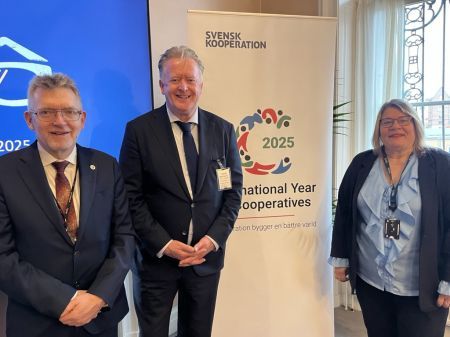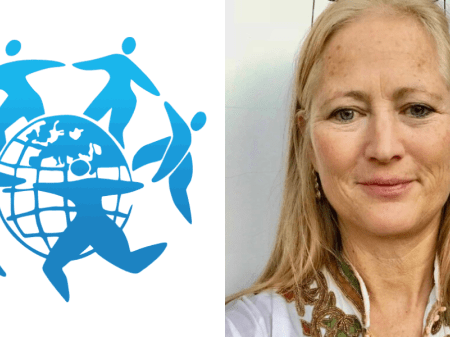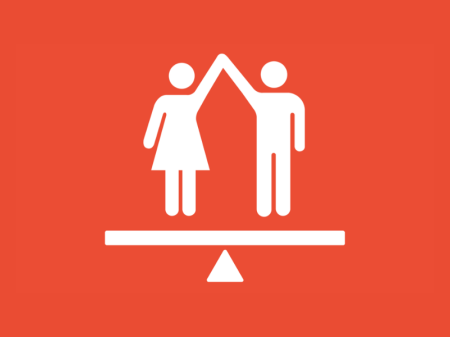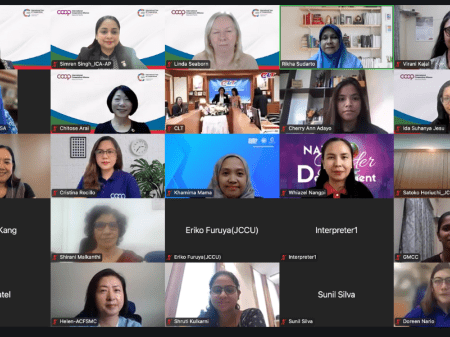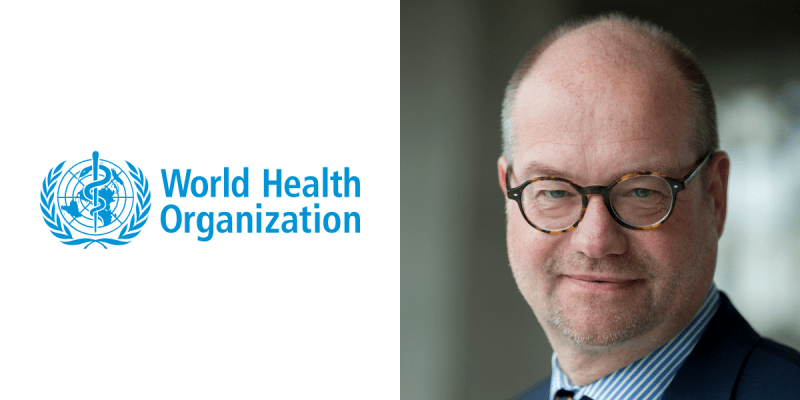
Born in Germany, Dr Rüdiger Krech has held a number of roles at the World Health Organzation, most recently as Director of the Department of Health Promotion in Geneva since September 2019. He heads WHO's work on risk factors such as tobacco consumption and harmful use of alcohol and is responsible for work on health-promoting settings and programs for more physical activity. His team also supports Member States with health literacy, empowerment and community engagement, public health legislation and fiscal measures to design wellbeing societies. Prior to joining WHO, Dr Krech worked at the German Agency for International Cooperation (GiZ), after being one of the first public health (MPH) graduates of a German university in 1991. He was awarded a doctorate in public health (DrPH) at the University of Bielefeld.
International Cooperative Alliance (ICA): Tell us about your work at the World Health Organization (WHO)?
Dr Rüdiger Krech: I'm the Director for Health Promotion, and that covers the areas of tobacco control, alcohol control and physical activity. And then we have the healthy settings approach, where we look at how to make cities, schools and workplaces healthier. Fiscal matters and health law are also in my department, as is the area of wellbeing of societies, and I know the cooperative movement can do a lot to make people healthier.
ICA: How do you see cooperatives doing this?
Dr Krech: Because cooperatives are active in so many areas. For instance, cooperative housing is housing that is affordable, and can be designed in a healthy way that also creates wellbeing, for example by having green spaces where residents can meet together and have a community life. Wellbeing is about having a sense of belonging and a sense of meaning. And cooperatives can do a lot to improve both of these.
Take the banking sector as another example: it's not just profit-making and investments, but about making life affordable. If you can create the sense of belonging together in cooperatives – which then do business together – you could, if done well, create more wellbeing.
ICA: I think that reflects very well the WHO’s mission, ‘Promote health and keep the world safe’. Cooperatives link different parts of lives together.
Dr Krech: That's right. If we keep people fit, happy and healthy, they are less likely to need to attend health services. Health is created in everyday life – where we live, where we grow, where we learn, where we play – and that has so much to do with cooperatives as well.
For instance, take community settings. The way we construct cities can foster community engagement and empowerment, or it can do the opposite. If this isn’t taken into consideration, there's a lot of loneliness. So if a cooperative looks at how to engage with the community – how to make community life more active, how to make decisions in a community, how to govern a community, how to make diverse opinions visible – that creates a sense of belonging and that creates health. I have not even mentioned the words ‘health services’ and ‘doctors’ yet, because all of these things happen outside of the healthcare sector.
If cooperatives take their mission seriously – whether they are active in health, housing, banking, agriculture, retail or any other sector – they can create so much more health. For example, to produce and consume locally has a lot of health benefits. It reduces CO2 emissions. It creates a sense of belonging, as I know from which farm the product comes from, and that I can see how the work of the farmers have helped to actually produce that food, and how we in the community then consume that product.
ICA: How can the ICA and its partners and members support the WHO’s mission?
Dr Krech: The cooperative movement is extremely important for us. But you sometimes have big supermarkets, which are cooperatives, but they act as if they were not cooperatives. You have banks, which are cooperative banks, which act as if they were private investment banks. So I urge the cooperative community to look back at their mandate, their mission, their vision, their values and principles and to translate that into today's and tomorrow's world of innovation, technological advancements and digitalisation.
In today's world, we're living in digital bubbles across the globe, but the cooperative movement has worked so hard to create communities in the areas where we actually live. The ability to thrive together and have this sense of meaning and belonging in our communities is an asset that we need to bring to the fore, in this age of permacrisis and mis and disinformation. If cooperatives work together to look at how we do agriculture, banking, living environment, health services, insurance etc, they can help to build this sense of belonging and help to answer these complex, overwhelming challenges. There are solutions at hand, which are offered by cooperatives, that we don't use to the best extent at the moment. So our ask is this: let's come together. Let's discuss how we can offer solutions, practical solutions, in such a difficult time. But that would also require the cooperative movement to come back to the missions under which it developed and grew.
ICA: There’s an interesting point about how the cooperative model and the idea of health and wellbeing are not just about staying alive but living and not just being but belonging. The theme for this year’s World Health Day (7 April 2025) was ‘Healthy beginnings, hopeful futures’. What are your hopes for the future?
Dr Krech: First of all, that we come to grips with the complex world in which we live, and that we do this by having cool heads and warm hearts. We are faced with populism and with dictators who try to gain so much attention, while the majority would just like to get on with their lives. Our answer to this will be driven by science, by evidence, out of which we then develop policy recommendations and conclusions. We do have an option here: so why not choose the healthy option, the wellbeing option? Why don't we create societies which are based on people's health and wellbeing? That is a real alternative and as the world is so much in turmoil, we must show a way that is also doable.
Another good thing is that today we not only know the ‘what’ to do, but the ‘how’ to do it, and that's fantastic. In so many areas of today's life, we have seen how we can really make a difference, how we can create healthy environments where people care for each other and it's good to live, and where we enjoy our lives while taking note of the planetary boundaries to ensure we're not over overspending the resources our planet has for us. That's not a sad life. On the contrary, it's a very nice life.
My plea to the cooperative movement is to be much more forthcoming, to really identify these alternatives, and communicate these to people so they know there are options.
ICA: SDG 3 seeks to ensure healthy lives and promote wellbeing for all ages. How do you see cooperatives supporting this goal?
Dr Krech: Each SDG has very tangible, concrete targets. SDG 3 has eight targets, and there are a couple that I see linking very well to the work of cooperatives. One such target is achieving universal health coverage so everyone who needs care, receives that care without falling into financial hardship. Cooperatives help a lot in achieving this, because they blend a primary healthcare model with health promotion and disease prevention.
But then when it comes to care, 80% of diseases that you have in a community are non-communicable - cardiovascular, cancer, diabetes, respiratory etc. We have to look at prevention and early detection, and escalate cases to specialists once we see an illness is about to develop, before offering specialised care that already helps save a lot of costs.
So for instance, we know that at least half of all non-communicable diseases can be prevented, and we can prevent them through five things: no tobacco; very little alcohol; good nutrition; physical activity; and reducing air pollution. Cooperatives could work on all of these. In particular you can help us fight the tobacco industry, which is a global player: there are six global corporations who are responsible for 8 million deaths every year. Cooperatives could help farmers who are growing tobacco to get out of tobacco into other products like nutritious food.
Then if we look at healthy nutrition, cooperatives can support the local production and consumption of healthy food – which would also improves the quality of our air because of lower transport needs.
There's many of these completely interrelated areas, where cooperatives play a huge role, but even from the examples I've just given you can see that the cooperative movement, while working in all these different sectors, has a lot of impact on global health.
ICA: What are your thoughts on and hopes for the World Social Summit?
Dr Krech: Now more than ever, we need multilateralism. So first of all, I hope the cooperative movement contributes to agreements in Doha that reiterate how world problems are completely interrelated. We cannot have national solutions only. I am advocating for a ‘glocal’ view, which means looking at the global challenges and finding local solutions – and that's what cooperatives can and are doing.
When I look at the first Social Summit in Copenhagen in the 1990s, many of the problems were known by then. Many of the problems we're facing today were known when the Club of Rome did its first report in 1972. The difference now is that we have the knowledge of how to address problems and actually put this into policy. But of course, this goes against very few, but very powerful, commercial interests. It's the tobacco and alcohol industries, big sugar, the junk food industry and the carbon industry as well. But there are so many other interests in the world too; what we're calling for is a society based on wellbeing economies, where there is so much profit to be made in developing new technologies which produce better health and wellbeing.
My hope is that now policy makers are seeing the huge risk of social upheaval, of more wars, they choose options that create a more peaceful, healthier and environmentally friendly world. The option is there. Nobody can say, ‘Oh, we didn't know’. We know and we can, and therefore we must.
ICA: The #IYC2025 theme is ‘Cooperatives build a better world’. In your view, how are cooperatives working to build a better world in the area of health and wellbeing?
Dr Krech: By being a business model based on people who know people, and people who work with people. And that creates a sense of meaning and a sense of belonging, which in turn creates wellbeing. So if that is the main purpose, let's go back to the roots of cooperatives, and let's build them into the future.

